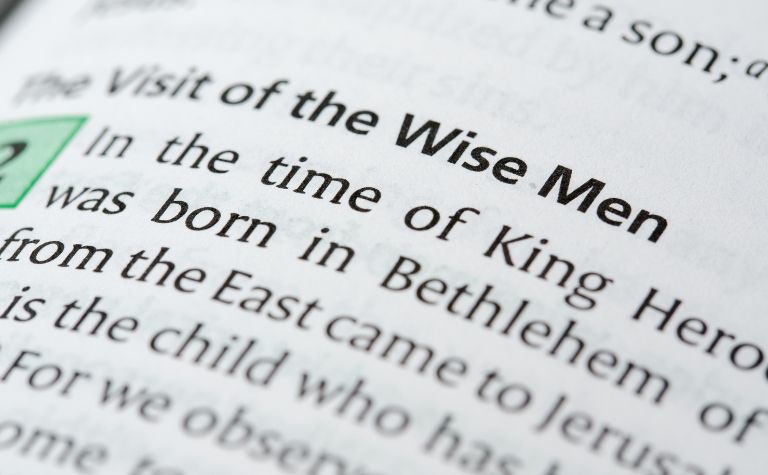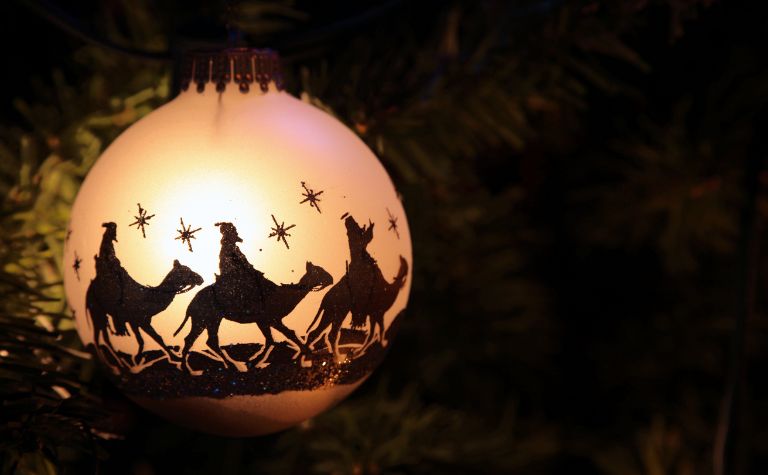The wise men (also called magi), who visited Jesus when he was an infant in Bethlehem, are often depicted as three in number, such as in the classic hymn, We Three Kings. However, sometimes well-known Bible stories develop legendary elements as a result of tradition. This leads people to wonder about how many wise men visited Jesus.
The Bible doesn’t specify how many wise men visited Jesus. The number three, while rooted in tradition, is an assumption that some have made based on the three gifts Matthew mentioned: gold, frankincense, and myrrh. The three gifts, however, don’t correspond to how many wise men there were in total.
Were the visitors wise men or magi? What was the purpose of their journey? What does Matthew say about the size of their group? What other traditional teachings about the wise men aren’t found in the Bible? Keep reading to learn the answers to these questions and others.
Also see How Old Was Mary When She Gave Birth to Jesus? to learn more.

What does Matthew say about the wise men?
Matthew reports that after Jesus was born, wise men from the East traveled to visit him: “Now after Jesus was born in Bethlehem of Judea in the days of Herod the king, behold, wise men from the east came to Jerusalem” (Matt. 2:1). The purpose of their visit was to pay homage to Jesus and worship him.
Are they magi or wise men? Some translations call the visitors “wise men” (ESV, KJV, NLT). Others call them “magi” (NIV, NASB). The Greek word is the plural form of magos, which literally means “magician.” Broadly, the word applies to a variety of people like non-Israelite priests, sages, and astrologers.
The term “magi” translates what the Greek says; the term “wise men” translates what the word means. “Magi” is technically more precise, but “wise men” isn’t misleading.
What does Matthew say about their number?
The original Greek doesn’t specify how many wise men there were, so no English translation of the Bible reflects that there were only three men. Other references to them in the passage don’t mention the total number in their entourage.
For example, Matthew writes, “Then Herod summoned the wise men secretly and ascertained from them what time the star had appeared” (2:7). In other verses of the passage, the wise men are referred to as “they” or “them,” yet Matthew doesn’t mention the exact number of their group.
Also see How Old Was Joseph When Jesus Was Born? to learn more.

How many gifts did the wise men give Jesus?
The traditional assumption that there were three wise men is based on the three gifts Matthew mentions: gold, frankincense, and myrrh. Yet, when people read the verse carefully, it becomes clear that Matthew doesn’t mention how many wise men there were.
“And going into the house, they saw the child with Mary his mother, and they fell down and worshiped him. Then, opening their treasures, they offered him gifts, gold and frankincense, and myrrh” (Matt. 2:11). Scholars and theologians corroborate that Matthew doesn’t specify their number.
New Testament scholar Leon Morris writes, “Tradition says there were three [wise men], but Matthew gives no number and it appears to be a deduction from the number of the gifts.” [1] Similarly, theologian D.A. Carson explains, “The theory that there were three wise men is probably a deduction from the three gifts.” [2]
Also see Was Jesus Born in April? to learn more.

What other beliefs about the wise men aren’t in the Bible?
Besides their number, the wise men are the source of other myths as tradition has developed around the details of their story. Sometimes when an important Bible story doesn’t reveal the details that some readers wish it would, they attempt to fill in the gaps. This reality calls for careful Bible study so readers can separate fact from fiction.
The names of the men
The Bible doesn’t mention the names of the wise men. Nevertheless, unreliable traditions have reported them to be Melchior, Caspar, and Balthasar. Most historians date these names to the 6th century after Jesus.
The timing of their visit
The Bible doesn’t say that the wise men arrived immediately after Jesus’ birth. In a lot of Christmas art, the wise men are pictured in the manger with Joseph, Mary, Jesus, the shepherds, and various barn animals. The wise men arrived later than the shepherds, probably in Jesus’ second year of life.
The rank of the men
Many scholars believe the wise men were priests and astrologers. [3] The Bible doesn’t say the wise men were kings. Some readers infer they were for a few reasons.
- First, the Old Testament alludes to kings giving gifts to the Messiah (e.g. Psa. 72:10-11). For some scholars, it’s not clear that the cited passage is a prophecy. Even if it is, it’s possible that the wise men could have been just delivering the gifts from the kings.
- Second, the wise men could have been lower-level dignitaries. Their gifts of gold, frankincense, and myrrh, reflect a wealth, as does their traveling entourage. Yet this doesn’t mean they were kings.
- Third, it would be a notable oversight if Matthew didn’t mention that the visitors were kings. If they were, it would have added significance to their journey, gift-giving, and worship of Jesus.
Also see How Old Was Jesus When the Wise Men Came? to learn more.
Where else does the Bible mention wise men?
Some Old Testament scholars believe that some of the people that Daniel mentions were a part of the magi’s ancestral line hundreds of years before Jesus.
- Daniel 1:20, “And in every matter of wisdom and understanding about which the king inquired of them, he found them ten times better than all the magicians and enchanters that were in all his kingdom.’
- Daniel 2:27, “Daniel answered the king and said, “No wise men, enchanters, magicians, or astrologers can show to the king the mystery that the king has asked.”
- Daniel 5:15, “Now the wise men, the enchanters, have been brought in before me to read this writing and make known to me its interpretation, but they could not show the interpretation of the matter.”
The term “magi” doesn’t just have positive connotations in the New Testament. The word, which is the source of the English word for “magic,” describes non-Christian religious practices.
- Acts 8:9, “But there was a man named Simon, who had previously practiced magic in the city and amazed the people of Samaria, saying that he himself was somebody great.”
- Acts 13:6, “When they had gone through the whole island as far as Paphos, they came upon a certain magician, a Jewish false prophet named Bar-Jesus.”
- Acts 13:8, “But Elymas the magician (for that is the meaning of his name) opposed them, seeking to turn the proconsul away from the faith.”
Also see Why Was Jesus Born In a Manger? to learn more.
References:
[1] The Gospel According to Matthew by Leon Morris. p. 36.
[2] Matthew by D.A. Carson. p. 85.
[3] Matthew by Craig L. Blomberg. NAC. p. 62.
Source
Source
Related Articles
The story of Jesus Christ's birth is one of the most well-known in the Bible. It includes Mary and Joseph, beautiful angels, adoring shepherds, a guiding light in the sky, and a dangerous threat from...
Joseph and Mary's relationship, including their betrothal and marriage, is one of the most iconic in the Bible. Mary is young, devout, and contemplative. Joseph is humble, obedient, and protective....
